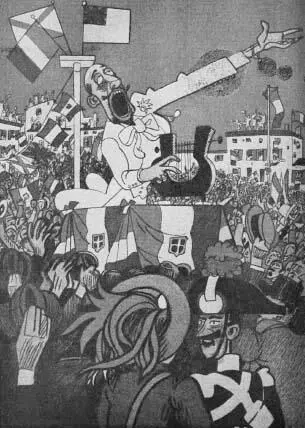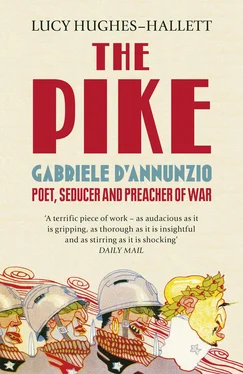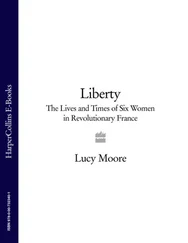Back in Paris, assiduous as ever in self-promotion, he gave a press conference. The Revue de Paris correspondent was positively shocked by the splendour of his wardrobe. His secretary had been busy chasing up the suits he had on order from his tailor, and his accounts for that month reveal he had also bought a prodigious number of new cravats. He delivered the text of his speech to Salandra, the Italian premier, and to newspaper editors in Paris and Milan, with strict instructions that it was to be embargoed until the morning of 5 May. He told the editor of Le Figaro, ‘the die is about to be cast’. The verbal flourish reveals that he saw himself as a second Julius Caesar, imposing a heroically martial destiny on an unwilling Rome.
He was given a grand send-off at the Gare de Lyon. ‘Women rushed to the station,’ he wrote. ‘Almost all of them were acquainted with my bed.’ Nathalie was not on the platform. D’Annunzio, who had begun referring to her as ‘the nuisance’, had sent her back to the farm. But the Amazon from Arcachon was in the crowd gathered to see him off, and so, probably, were several of his other lovers. The lesbian novelist Sibilla Aleramo, like him a member of the sexually ambiguous coterie who met at Nathalie Barney’s salon, and a friend of the painter Romaine Brooks, whose only male lover he was, alleges he had been carrying on affairs with ‘four, five or six’ women simultaneously during the previous year.
On 4 May 1915, just over five years after he had left Italy bankrupt and with ignominious haste, he recrossed the border. While he had dallied in Paris through the first months of the war, ordering haute-couture outfits for his dogs (red and blue, made by the couturier Charles Worth), teaching himself glass-blowing and twiddling at the recipe for his patent perfume, d’Annunzio had become, in his compatriots’ collective imagination, the man who could save their national honour. He had left the country as a celebrity whose escapades, however amusing, were becoming undignified. He returned as a nationalist messiah.
Giosuè Carducci, the great poet of the previous generation, had heralded the advent of such a man. ‘Prepare the way for the master who is to come, for the spirit of Italy, grand and great, for the genius, the beatings of whose approaching wings we already hear.’ So had d’Annunzio himself, writing enigmatically that ‘He will come from the silence, defeating death,/The necessary Hero.’ During his absence in France he had, for Italians of a nationalist and militarist persuasion, acquired the status and glamour of such a messianic hero. In Milan, his supporters organised a series of readings of his poems to celebrate his advent. ‘Rapt in his sublime visions, he seemed to have forgotten his beautiful fatherland,’ wrote an admirer. ‘But no! As soon as the new dawn appeared in the skies, he arose proudly and with a shudder of love he ran to the breast of the great mother.’
As d’Annunzio’s train approached the great mother’s border, he bound his eyes, lest, as he explained, the first sight of his homeland prove too emotionally overwhelming. Once he was on Italian territory, he was met at every stop by enthusiastic crowds. Young women climbed on the train’s running board, kissing the glass of his compartment’s windows and handing him flowers. In Turin, according to the following day’s Corriere della Sera, ‘thousands of hands reached out to him’, while d’Annunzio, with a catch in his throat, addressed them from the window of the train. As he approached Genoa, a professor at the university cancelled a lecture, urging his students not to learn history but to go meet d’Annunzio at the station and ‘live history’ instead.
With difficulty d’Annunzio was got into a motor car and driven through the press of people. Safely arrived at his hotel, he came out onto a balcony and spoke to the excited crowd. ‘Five long years of absence and sadness lie behind me, abolished!’ There had, in fact, been nothing but his own inclination to prevent him returning to Italy earlier, but he referred to his absence as an ‘exile’. ‘Now I live, I wish only to live, a new life.’
The next day he spoke on the waterfront. Having read the text of his oration, King Victor Emmanuel had decided he had better stay away. So did all the government ministers. Italy was still neutral. D’Annunzio’s rhetoric was too aggressive to receive the sanction of a royal or ministerial audience. He was not, however, asked to tone it down.
The quayside was thronged. Some hundred survivors of Garibaldi’s ‘Thousand’, living mementoes of Italy’s heroic foundation, were there, as well as the new Garibaldini in their Paquin-tailored tunics. News photographs show the monument engulfed in a sea of straw boaters. Men (there are few women visible) scramble out on the rocks for a better view, or take to their boats to avoid the crush on land. The mayor, who opened proceedings, addressed himself to the dignitaries assembled on the platform. Neatly demonstrating his understanding of the modern political process by turning the other way, d’Annunzio spoke out to the crowd.

Without any kind of amplification, he could make himself heard by thousands. The German caricaturist, Trier, depicted him later that year as a ranter, his face contorted, his mouth gaping wide. But the image is misleading. Even when inciting his hearers to make war, his strategy was not to harangue but to fascinate and seduce. His language was violent, his manner dulcet. His oration at Quarto was a magnificent piece of word-music. In it d’Annunzio paid tribute to the heroism of ‘The Thousand’, thus appropriating their glory for himself. He quoted Garibaldi’s most famous line: ‘Here we make Italy, or we die!’ He spoke of the noble aspirations of Rome’s ancient heroes. He flattered his audience and challenged them, daring them to be worthy of their great antecedents. He wrapped his provocative politics in the lulling grandeur of liturgical rhythms. He ended with a series of beatitudes:
Blessed are the young who hunger and thirst for glory, for they shall be satisfied …
Blessed are the merciful, for they shall be called upon to staunch a splendid flow of blood, and dress a wonderful wound …
Blessed are they that have most, because they can give most, dare most …
Blessed are they who return with victories, for they shall see the new face of Rome.
It was incantatory. It was enthralling. It was blasphemy. ‘This man!’ wrote Romain Rolland, outraged. ‘This man, who is the incarnation of literary falsehood, dares to pose as Jesus!’ Rolland had once enjoyed d’Annunzio’s company, but they were now diametrically opposed in their attitudes to war. Rolland was a pacifist, while d’Annunzio had recreated ‘the Sermon on the Mount to incite Italy to violate her treaties and make war on her allies’.
There were those who thought d’Annunzio’s showmanship too contrived and his speech preposterously over-erudite. But d’Annunzio knew what he was doing. He was aware that politics was a performance art. Later in the year he noted how dull and patronising was a priest who spoke over-simply to uneducated solders, ‘believing that humble hearts don’t know how to understand high and noble eloquence’. That was not a mistake he ever made. He offered intoxicating rhythms, clanging declarations, the invocation of grand abstractions and resonant myth. Whether or not his audience followed the meaning of everything he said, they responded fervently to the hypnotic way he said it. At Quarto the crowd surged forward, sang the Marseillaise in sign of their support for their ‘Latin sister’ France, and shouted out for war.
Читать дальше













